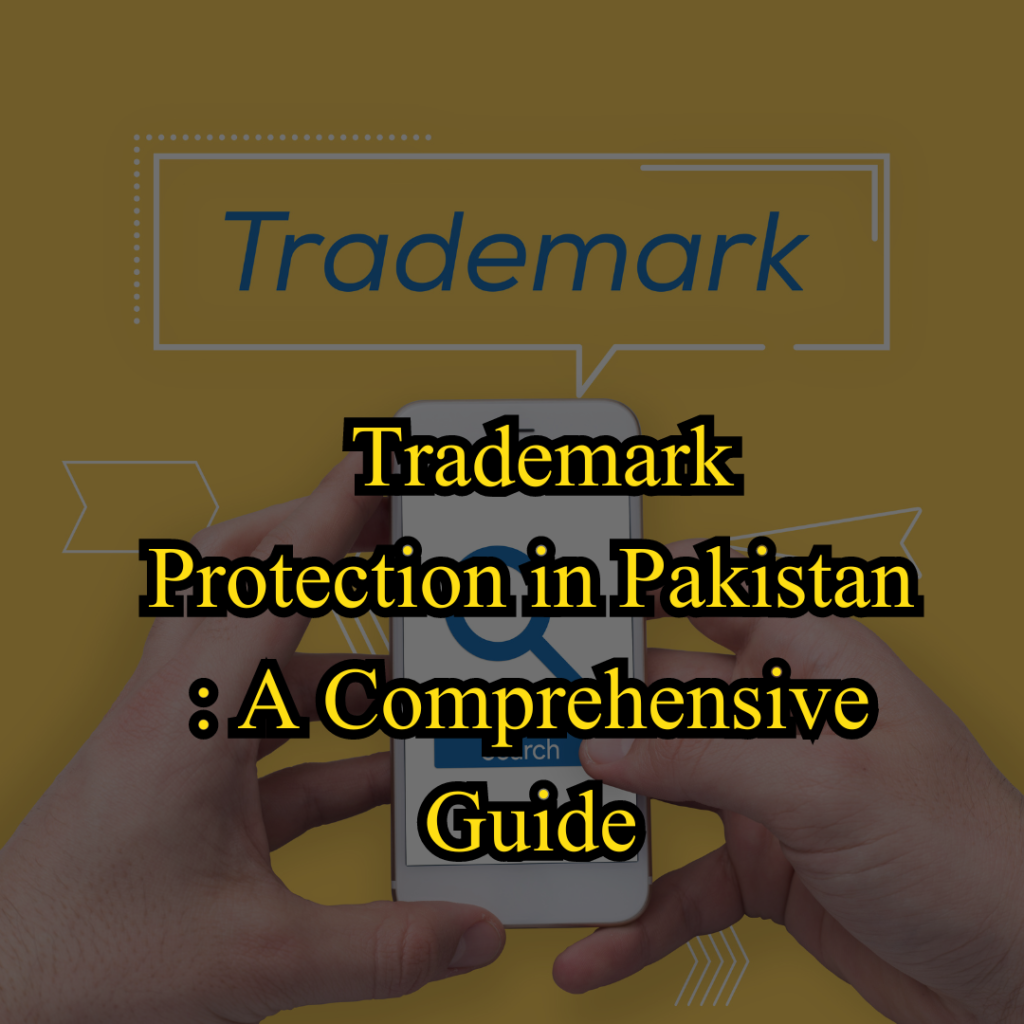
Intellectual property (IP) has become an essential asset for businesses in a world where creativity and innovation are the driving forces behind corporate success. All works of literature, art, inventions, designs, names, symbols, and pictures utilized in trade are considered intellectual property. It includes a range of rights that let people and companies safeguard and profit from their original and creative work. The following article will provide you a thorough understanding of how to defend your trademark in Pakistan. It will detail the registration procedure, what to do if your rights are violated, and how our legal services may help.
Understanding Intellectual Property
Intellectual property is divided into several categories, each protecting different types of creations:
- Patents: These protect new inventions or discoveries, granting exclusive rights to make, use, or sell the invention for a limited period, usually 20 years.
- Copyrights: These safeguard original works of authorship, including literary, musical, and artistic works. Copyright protection generally lasts for the life of the author plus 50 years.
- Trademarks: These protect signs capable of distinguishing goods or services of one enterprise from those of others. Trademarks include logos, names, symbols, and other distinctive signs.
- Trade Secrets: These involve confidential business information that provides a competitive edge, such as formulas, practices, processes, or designs.
Among these, trademarks play a vital role in branding and marketing. They serve as a key tool for businesses to establish their identity, ensure consumer recognition, and build a reputation in the marketplace.
Trademark Protection in Pakistan
The Trade Marks Ordinance, 2001 governs trademark protection in Pakistan. The Intellectual Property Organization of Pakistan (IPO-Pakistan) is responsible for overseeing the registration and protection of trademarks, and this Act offers a thorough framework for these activities. By securing legal recognition for your brand and preventing unauthorized usage, trademark protection helps you keep your competitive advantage and good name in the marketplace.
1. The Trademark Registration Process
Trademark Search
Before filing for trademark registration, conducting a trademark search is advisable. This search helps determine whether your desired trademark is available or if it conflicts with existing trademarks. The search can be performed through IPO-Pakistan’s online database or with the assistance of a legal expert specializing in intellectual property. A thorough search helps avoid potential conflicts and ensures that your trademark is distinctive and non-infringing.
Filing an Application
Once the availability of your trademark is confirmed, the next step is to file an application with IPO-Pakistan. The process involves:
- Preparing the Application: The trademark must be clearly displayed in the application, along with information about the applicant and the products or services it will represent. The trademark must be unique and should not be confusingly similar to already-registered trademarks.
- Submission and Fees: Send the completed application form and the required payment. Depending on how many classes you want to register for, there are different fees. A class is a group of products or services, and the amount you pay depends on how many classes your application contains.
- Examination: In order to make sure the application complies with legal criteria; IPO-Pakistan will review it. This will involve looking for trademark conflicts with already-registered products and determining whether the trademark is sufficiently distinctive.
Publication and Opposition
After examination, the trademark will be published in the Trademark Journal. This publication serves as a notice to the public, allowing third parties to oppose the registration if they believe it infringes on their existing rights. If no opposition is filed within the specified period or if oppositions are resolved in your favor, the trademark proceeds to registration.
Registration and Renewal
Upon successful registration, you will receive a trademark certificate, granting you exclusive rights to use the trademark for the goods or services specified in the registration. The registration is valid for ten years from the date of registration and can be renewed indefinitely for successive ten-year periods.
2. Additional Considerations for Trademark Protection
International Protection
If your business operates or plans to expand internationally, consider seeking trademark protection in other countries. Pakistan is a member of several international treaties, including the Madrid Protocol, which allows for the registration of trademarks in multiple countries through a single application. This simplifies the process of securing international trademark protection.
Monitoring and Enforcement
Ongoing monitoring of the market is crucial for effective trademark protection. Regularly check for unauthorized use of your trademark and take proactive steps to enforce your rights. This may involve setting up alerts for potential infringements and periodically reviewing your trademark’s use in the market.
Responding to Trademark Infringement
Trademark infringement occurs when a third party uses a trademark that is identical or confusingly similar to your registered trademark, leading to potential consumer confusion. If you suspect that your trademark rights are being infringed, you can take the following actions:
1. Cease and Desist Letter
A cease and desist letter is often the first step in addressing trademark infringement. This letter formally notifies the infringer of your trademark rights and demands that they stop using the infringing trademark. The letter should include:
- Details of the Infringement: A clear description of how the infringing trademark is similar to yours and how it is being used.
- Evidence: Documentation of your trademark registration and evidence of the infringement.
- Demand for Action: A request for the infringer to cease the use of the trademark and assurances of non-recurrence.
- Timeline: A deadline for the infringer to comply with your demands.
A well-drafted cease and desist letter can often resolve the issue without the need for further legal action.
2. Filing a Complaint with IPO-Pakistan
If the infringing party does not comply with the cease and desist letter, you can file a formal complaint with IPO-Pakistan. IPO-Pakistan has the authority to address trademark disputes and can issue orders to prevent further infringement. The process involves:
- Filing the Complaint: Submit a formal complaint detailing the infringement and providing evidence of your trademark registration.
- IPO-Pakistan’s Role: IPO-Pakistan will investigate the complaint and may mediate between the parties. If necessary, the organization can issue directives to stop the infringing activity.
3. Pursuing Legal Action
If administrative remedies are insufficient, you may need to pursue legal action in the courts. This typically involves filing a lawsuit for trademark infringement. In such cases, you can seek:
- Injunctions: Court orders to stop the infringing activity and prevent further use of the trademark.
- Monetary Damages: Compensation for financial losses incurred as a result of the infringement.
- Legal Costs: Reimbursement for legal expenses incurred during the litigation process.
Steps in the Legal Process
- Preparing the Case: Collaborate with your legal team to gather evidence, prepare legal arguments, and file the necessary documents with the court.
- Court Proceedings: Attend court hearings and provide testimony to support your claim.
- Enforcement of Judgments: If successful, work to enforce the court’s judgment and ensure compliance by the infringing party.
Key Case Laws in Trademark Protection in Pakistan
Understanding key case laws related to trademark protection can provide valuable insights into how courts interpret and enforce trademark rights in Pakistan. Here are some significant cases:
1. Gul Ahmed Textile Mills Limited v M/s. Millat Tractors Limited (2012 PLD 683)
This case is a landmark decision in Pakistan’s trademark jurisprudence. Gul Ahmed Textile Mills Limited, a renowned textile manufacturer, had registered the trademark “Gul Ahmed” for its products. Millat Tractors Limited used a similar mark for its goods, leading to a trademark dispute.
The Lahore High Court ruled in favor of Gul Ahmed Textile Mills Limited, emphasizing the importance of distinctive marks and preventing consumer confusion. The court upheld the principle that a trademark must be distinctive enough to identify the origin of goods or services and prevent unfair competition. This case highlights the significance of protecting well-established trademarks against similar marks that could mislead consumers.
2. M/s. Engro Corporation Limited v. M/s. Engro Foods Limited (2015 CLD 1065)
In this case, Engro Corporation Limited, a major player in the Pakistani market, faced a trademark dispute with Engro Foods Limited. Both companies used similar trademarks for their products, leading to confusion among consumers.
The Supreme Court of Pakistan ruled that the similarity between the trademarks was likely to cause confusion and deceit among consumers. The court emphasized that trademarks must be evaluated not only on their appearance but also on their overall impression on the public. This case underscores the need for a comprehensive assessment of trademark similarity to prevent consumer confusion.
3. The Coca-Cola Company v. The Coca-Cola Bottling Company of Lahore (2018 CLD 1234)
This case involved The Coca-Cola Company, a globally recognized brand, suing The Coca-Cola Bottling Company of Lahore for using a similar mark that could potentially damage the brand’s reputation and cause consumer confusion.
The court ruled in favor of The Coca-Cola Company, emphasizing that well-known trademarks are entitled to broader protection against any use that could dilute their distinctiveness. This decision reaffirms that famous trademarks have a heightened level of protection to prevent unauthorized use that could harm their global reputation.
4. S.A. Associates v. S.A. Traders (2020 CLD 432)
In this trademark dispute, S.A. Associates challenged S.A. Traders for using a similar name in their business operations. The court ruled in favor of S.A. Associates, highlighting that even slight similarities in trademarks could lead to consumer confusion and unfair competition. This case demonstrates the importance of distinctiveness and the need to avoid any resemblance that could mislead the public.
Why Choose Our Legal Services?
Navigating the complexities of trademark registration and enforcement requires expertise and attention to detail. Our legal team specializes in intellectual property law in Pakistan and offers comprehensive services to protect your trademark effectively. Here’s why you should consider our services:
Expert Guidance
We provide expert advice on all aspects of trademark protection, including conducting thorough searches, filing applications, and addressing potential conflicts. Our team ensures that your trademark registration is handled efficiently and strategically.
Personalized Support
We offer personalized support throughout the trademark registration process and beyond. From initial filing to dealing with oppositions and renewals, we are committed to making the process smooth and successful for you.
Effective Enforcement
In the event of trademark infringement, we provide robust legal support to address and resolve disputes effectively. Our team is experienced in negotiating settlements, filing complaints, and pursuing legal action to protect your rights.
International Expertise
If your business has a global presence or plans to expand internationally, we can assist with trademark registration and protection in other jurisdictions. Our knowledge of international treaties and processes helps simplify the protection of your trademark across borders.
Conclusion
Protecting your trademark is essential for maintaining your brand’s identity and ensuring its continued success in Pakistan’s competitive market. By understanding the registration process, taking proactive measures to monitor and enforce your trademark rights, and seeking expert legal assistance, you can secure your brand’s future and uphold its value.
If you need expert guidance and support for your trademark protection needs, contact us today. Our dedicated legal team is here to provide the expertise you need to navigate the complexities of intellectual property law in Pakistan and beyond. Your brand’s protection is our top priority, and we are committed to helping you achieve and maintain the best possible outcomes.
Relevant Articles: Void and Voidable Contracts in Pakistan?


I’m really impressed along with your writing skills
and also with the format for your weblog.
Is this a paid theme or did you modify it yourself? Anyway keep up the excellent high quality writing, it’s
rare to peer a great weblog like this one these days.
Youtube Algorithm!